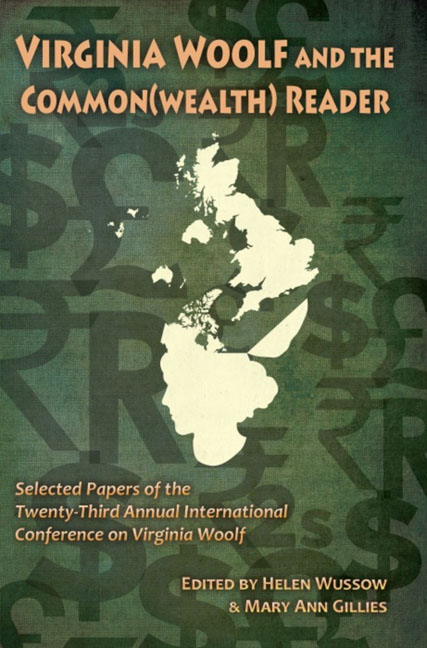Book contents
- Frontmatter
- Contents
- Introduction to Virginia Woolf and the Common(wealth) Reader
- Acknowledgments
- List of Abbreviations
- Invocations
- Networks of Affiliation: Foundations and Friends
- Woolf and the Commonwealth
- 1930s Onwards
- Woolf Beyond the Book
- Preserving Our History of Reading Woolf: The Common Wealth of Our Past and Future
- Adventures in Common: Investing with Woolfs and ”Securitas”
- Printing “Prelude”: Virginia Woolf's Typsetting Apprenticeship and Katherine Mansfield on “Other People's Presses”
- The Hogarth Press, Digital Humanities, and Collaboration: Introducing the Modernist Archives Publishing Project (MAPP)
- Woolf Blogging, Blogging Woolf: Using the Web to Create a Common Wealth of Global Scholars-Readers
- Notes on Contributors
- Conference Program
Adventures in Common: Investing with Woolfs and ”Securitas”
from Woolf Beyond the Book
- Frontmatter
- Contents
- Introduction to Virginia Woolf and the Common(wealth) Reader
- Acknowledgments
- List of Abbreviations
- Invocations
- Networks of Affiliation: Foundations and Friends
- Woolf and the Commonwealth
- 1930s Onwards
- Woolf Beyond the Book
- Preserving Our History of Reading Woolf: The Common Wealth of Our Past and Future
- Adventures in Common: Investing with Woolfs and ”Securitas”
- Printing “Prelude”: Virginia Woolf's Typsetting Apprenticeship and Katherine Mansfield on “Other People's Presses”
- The Hogarth Press, Digital Humanities, and Collaboration: Introducing the Modernist Archives Publishing Project (MAPP)
- Woolf Blogging, Blogging Woolf: Using the Web to Create a Common Wealth of Global Scholars-Readers
- Notes on Contributors
- Conference Program
Summary
Introduction: “a society for asking questions” —V. Woolf
In 1997, a group of faculty women at Washington State University formed an investment club. Because we knew too little about retirement funds and investment options in general, we, like the women in Virginia Woolf's “A Society” (1920), formed one “for asking questions” (CSF 125). In Woolf's story, women who critically examine men's accomplishments do provide a report on “the Stock Exchange,” but we're not told what it says (CSF 131). We only know that “Sir Harley Tightboots” refused to talk about “the capitalist system” (CSF 132). Today, far more easily than for Woolf's “daughters of educated men” (TG 4), women can enter financial professions. Laywomen can study stocks and buy and sell online. Do we still need Woolf's warning in Three Guineas about barren “lives” and skewed “loyalties” (70)?
Optimistically, we named our group “Pleiades.” In one version of the myth, Zeus transformed the daughters of Atlas and Pleione into a cluster of stars in the constellation Taurus (the Bull). During a “bull market,” stock values increase, although our club's aim was less to make money than to learn about stocks and market cycles. With monthly contributions of $30, not enough to bankrupt any of us, we affiliated with a national organization called “Better Investing.” How do we avoid the boredom that had kept some of us from facing our finances in the past? Motivating each other to research stocks, we meet in our homes and leaven business with food, wine, and conversation.
As a small investor myself, then, I was intrigued to discover that in the 1930s the Hogarth Press published two books on investing, partly in response to the “great slump” or “great crash” of 1929. The first was Financial Democracy (1933) by Margaret Miller and Douglas Campbell. My focus is the second book, Adventures in Investing (1936) by “Securitas,” pen name for C. Patrick Th ompson, financial editor of Time and Tide. He got my attention by calling investment not a “fixed science,” but a “great and ruthless game,” “an impassioned drama,” and an “adventure” that takes us “among the roots of life itself ” (“Securitas” 24, 9).
- Type
- Chapter
- Information
- Virginia Woolf and the Common(wealth) Reader , pp. 205 - 211Publisher: Liverpool University PressPrint publication year: 2014



